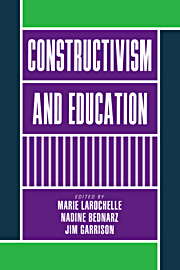Book contents
- Frontmatter
- Contents
- Preface
- List of contributors
- I Introduction
- II From epistemological constructivism to teaching: a variety of views
- III Teaching within the constructivist mode: practices and promises
- IV The mediating role of teachers and teacher education
- 12 Sociocultural perspectives on the teaching and learning of science
- 13 Remarks on the education of elementary teachers
- 14 Constructivism as a referent for reforming science education
- V Conclusion
- Notes
- References
- Index
12 - Sociocultural perspectives on the teaching and learning of science
Published online by Cambridge University Press: 04 August 2010
- Frontmatter
- Contents
- Preface
- List of contributors
- I Introduction
- II From epistemological constructivism to teaching: a variety of views
- III Teaching within the constructivist mode: practices and promises
- IV The mediating role of teachers and teacher education
- 12 Sociocultural perspectives on the teaching and learning of science
- 13 Remarks on the education of elementary teachers
- 14 Constructivism as a referent for reforming science education
- V Conclusion
- Notes
- References
- Index
Summary
Teaching and learning can be viewed as forms of enculturation into a community of practice. Usually teaching and learning are considered to occur in classrooms, which can be regarded as evolving communities of practice in which the discursive practices (e.g., talk, writing, cognition, argumentation, and representation) of participants are constantly changing in response to the interactions of a teacher and students, not only with one another, but also with social structures, such as conventions and norms (e.g., McGinn, Roth, Boutonné, and Woszczyna, 1995; Roth, 1995) and power relations (Bourdieu, 1991). Learning in such communities, it is argued, is most effective when the cultural resources of participants are acknowledged as capital for learning, teachers and learners can access a shared language, and power is equitably distributed (Tobin, 1997).
In a community that is learning science one might expect to see students engage in ways such that the discourse of a class would become more sciencelike over time. Discourse, as it is used here, refers to a “social activity of making meanings with language and other symbolic systems in some particular kind of situation or setting” (Lemke, 1995, p. 8). For instance, if science can be regarded as a form of argument in which emerging conceptual understandings are related to evidence and their fit with canonical science (Kuhn, 1993), then one might expect a form of discourse that involves students routinely in arguments over the efficacy of the warrants for knowledge claims. Social interactions using a shared language enable the teacher and learners to communicate and test the fit of their knowledge with others’ representations.
- Type
- Chapter
- Information
- Constructivism and Education , pp. 195 - 212Publisher: Cambridge University PressPrint publication year: 1998
- 9
- Cited by

